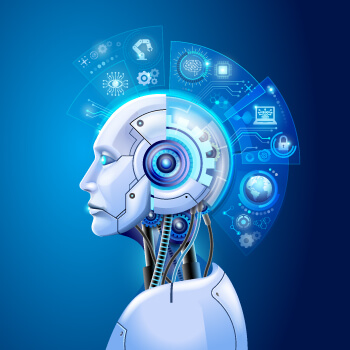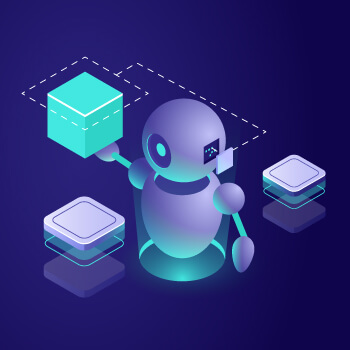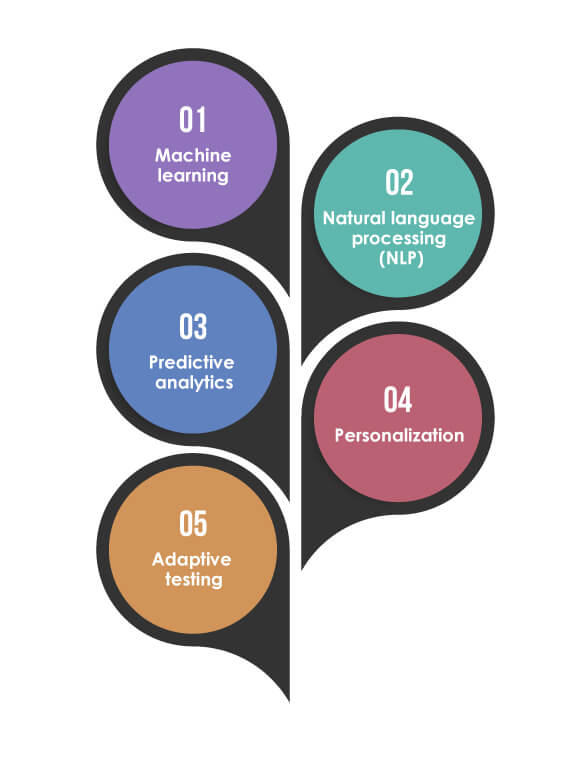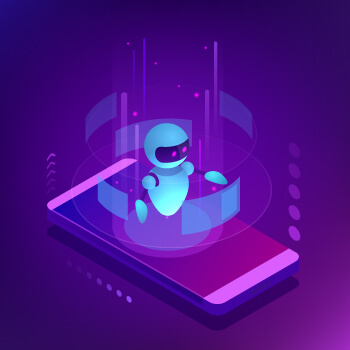Published: 02 May 2023
Adaptive AI: A Game-Changer in the World of Artificial Intelligence
Last Updated: 14 Dec 2023
Content
1. An Overview of Adaptive AI
2. Importance of Adaptive AI in Today’s World
3. Common Adaptive AI Techniques Leveraged by Digital Businesses
4. Real-world Applications of Adaptive AI
5. Key Advantages of Adaptive AI
6. What is the Future of Adaptive AI?
7. Conclusion
8. How TestingXperts Helps Businesses with AI Testing?
An Overview of Adaptive AI

Adaptive AI is an emerging field of artificial intelligence that seeks to create intelligent systems capable of adapting to changing circumstances and learning from new experiences. This form of AI is designed to be flexible, capable of modifying its behavior in response to new information or changes in the environment.
The technology utilizes a variety of techniques and algorithms to enable machines to learn from experience, recognize patterns, and make predictions. These techniques include machine learning, neural networks, reinforcement learning, and evolutionary algorithms, among others.
Importance of Adaptive AI in Today’s World

The importance of adaptive AI in today’s world cannot be overstated. As the amount of data generated by individuals and businesses continues to grow, the ability to analyze and make sense of that data will be essential for success in virtually every industry. Adaptive AI systems are uniquely positioned to provide this analysis, making them a critical tool for organizations of all kinds.
One of the key advantages of adaptive AI is its ability to personalize experiences for individual users. Adaptive AI also has important implications for businesses, as it can help companies optimize their operations and improve customer engagement. By analyzing data on user behavior and preferences, adaptive AI systems can provide tailored recommendations, search results, and other content that is more relevant and useful to each individual user.
Common Adaptive AI Techniques Leveraged by Digital Businesses

Adaptive AI is one such technique that enables businesses to make decisions based on real-time data and user behavior. Here are some of the most common adaptive AI techniques used by digital businesses:
Machine learning:
Machine learning is a subset of AI that enables machines to learn from data and improve their performance over time. Digital businesses use machine learning algorithms to analyze user behavior, identify patterns, and make predictions. This technique is commonly used in recommendation engines, fraud detection systems, and chatbots.
Natural language processing (NLP):
NLP is a branch of AI that enables machines to understand and interpret human language. Digital businesses leverage NLP to build chatbots and virtual assistants that can understand customer queries and provide relevant responses. This technique is also used in sentiment analysis, where businesses analyze customer feedback to gauge their satisfaction levels.
Predictive analytics:
Predictive analytics is a technique that uses data mining, machine learning, and statistical algorithms to predict future outcomes based on historical data. Digital businesses use predictive analytics to forecast sales, identify customer churn, and optimize marketing campaigns. This technique enables businesses to make data-driven decisions and stay ahead of the competition.
Personalization:
Personalization is a technique that uses AI to tailor content and recommendations to individual users based on their preferences and behavior. Digital businesses use personalization to improve the customer experience and increase engagement. This technique is commonly used in e-commerce, where businesses recommend products based on a user’s browsing and purchase history.
Adaptive testing:
Adaptive testing is a technique that uses AI to adapt the difficulty level of tests based on a user’s performance. Digital businesses use adaptive testing to improve learning outcomes and provide personalized feedback to users. This technique is commonly used in online education platforms and certification programs.
Overall, adaptive AI techniques enable digital businesses to make data-driven decisions, improve customer experience, and stay ahead of the competition. As the digital landscape continues to evolve, businesses that leverage these techniques will have a competitive advantage in the market.
Real-world Applications of Adaptive AI

Adaptive AI This technology has a wide range of real-world applications across multiple industries, from healthcare to finance. Here are a few examples of how adaptive AI is currently being used in various fields.
Healthcare:
Adaptive AI is being used in the healthcare industry to provide more personalized care to patients. For example, adaptive AI algorithms can analyze patient data in real-time, such as vital signs, lab results, and medical history, to predict the likelihood of a patient developing certain diseases or conditions. These predictions can then be used to create tailored treatment plans that are specific to each patient’s needs. Adaptive AI can also help doctors identify patients who are at risk of developing complications after surgery, allowing for earlier intervention and better outcomes.
Finance:
Adaptive AI is being used in the finance industry to improve investment decisions and risk management. For example, adaptive AI algorithms can analyze market data and identify patterns and trends that may be missed by human analysts. This can lead to more accurate predictions of future market behavior and better investment decisions. Adaptive AI can also be used to detect fraudulent activities, such as credit card fraud, by learning from past transactions and identifying unusual patterns in real-time.
Education:
Adaptive AI is being used in the education industry to personalize learning experiences for students. For example, adaptive AI algorithms can analyze student performance data, such as test scores and homework assignments, to identify areas where students may be struggling. This information can then be used to create customized lesson plans that focus on the student’s specific needs. Adaptive AI can also provide real-time feedback to students, allowing them to adjust their learning strategies as needed.
Transportation:
Adaptive AI is being used in the transportation industry to improve traffic flow and reduce congestion. For example, adaptive AI algorithms can analyze traffic patterns and adjust traffic lights in real-time to optimize traffic flow. This can lead to shorter commute times and less congestion on the roads. Adaptive AI can also be used to improve public transportation systems by predicting demand for certain routes and optimizing bus and train schedules accordingly.
Manufacturing:
Adaptive AI is being used in the manufacturing industry to optimize production processes and reduce waste. For example, adaptive AI algorithms can analyze production data, such as machine performance and energy consumption, to identify areas where efficiency can be improved. This information can then be used to adjust production schedules and optimize machine settings, leading to reduced energy consumption and improved production efficiency.
Key Advantages of Adaptive AI

Here are some key advantages of adaptive AI:
Increased Personalization:
Adaptive AI systems can personalize content, products, and services to the unique needs and preferences of individual users. This can lead to increased engagement and satisfaction among users, as they feel that the system is tailored to their specific needs.
Improved User Experience:
Adaptive AI can provide users with a more intuitive and streamlined experience. By analyzing user behavior and preferences, adaptive AI can anticipate user needs and provide relevant suggestions and recommendations.
Enhanced Customer Service:
Adaptive AI can improve customer service by providing personalized responses and solutions to customer inquiries. This can help businesses save time and money by automating routine customer service tasks.
Increased Efficiency:
Adaptive AI can optimize business processes by automating tasks that would otherwise require human intervention. This can lead to increased efficiency and productivity, as well as cost savings.
Better Decision Making:
Adaptive AI can provide businesses with insights into user behavior and preferences, which can inform strategic decision-making. By analyzing user data, adaptive AI can identify trends and patterns that can be used to optimize business operations.
Overall, adaptive AI has the potential to revolutionize the way businesses interact with their customers and optimize their operations. By providing personalized experiences and insights into user behavior, adaptive AI can help businesses stay competitive in an increasingly crowded marketplace.
What is the Future of Adaptive AI?

The future of Adaptive AI is poised to revolutionize industries across the board. Adaptive AI refers to the ability of an AI system to learn and adapt over time, improving its performance and accuracy based on experience and feedback. This allows the AI system to make better decisions and predictions, as well as to handle more complex tasks.
With the potential to transform industries and improve lives in countless ways, the future of Adaptive AI is incredibly exciting. However, it is important to approach these advancements with caution and to ensure that they are developed and implemented in an ethical and responsible manner.
Conclusion
Adaptive AI is an exciting and rapidly growing field of artificial intelligence that has the potential to revolutionize many industries. Its ability to learn and adapt in real-time makes it a powerful tool for solving complex problems and improving decision-making processes. However, it is also important to consider the ethical and societal implications of these technologies as they continue to develop.
How TestingXperts Helps Businesses with AI Testing?
TestingXperts (Tx) is one of the world’s top 5 pure-play software testing services providers globally. Tx has been chosen as a trusted QA partner by Fortune clients and ensures superior testing outcomes for its global clientele. We have rich expertise in enabling end-to-end testing services for global clients across various industry domains like healthcare, telecom, BFSI, retail & eCommerce, etc. With our domain knowledge and with over a decade of pure play testing experience, the company has been serving the global clientele with high-quality next-gen testing services to deliver superior solutions to clients.
We offer state-of-the-art testing services to help you ensure that your AI systems are performing optimally and accurately. Our testing services are designed to help you stay ahead of the competition by providing you with the insights you need to make informed decisions about your AI systems.
TestingXperts’ AI Testing Differentiators
Comprehensive testing:
Our testing services cover all aspects of your AI systems and AI models, including data pipeline and data processing, algorithmic performance, and system integration. This ensures that you receive a comprehensive analysis of your AI system’s performance.
Adaptive testing:
Our testing services are designed to adapt to your AI system’s changing needs. As your AI system evolves and learns, we adjust our testing methods to ensure that we are providing you with the most accurate and up-to-date insights.
Experienced team:
Our team of experts has years of experience in testing and validating AI systems. We bring a wealth of knowledge and expertise to every testing engagement, ensuring that you receive the highest quality testing services.
State-of-the-art tools and in-house accelerators:
We use the latest testing tools and proprietary accelerators to provide you with the most accurate and reliable results. Our tools are designed to be efficient and effective, minimizing testing time and maximizing insights.
Our Services:
Data quality testing:
We test the quality of your data to ensure that it is clean, accurate, and relevant to your AI system’s needs. This helps to ensure that your AI system is making informed decisions based on high-quality data.
Algorithmic testing:
We test your AI system’s algorithms to ensure that they are performing optimally and accurately. This helps to ensure that your AI system is making the right decisions and predictions.
Integration testing:
We test the integration of your AI system with other systems and platforms to ensure that it is working seamlessly and efficiently. This helps to ensure that your AI system is integrated into your business processes and workflows.
Performance testing:
We test the performance of your AI system to ensure that it is meeting your performance requirements. This helps to ensure that your AI system is delivering the results you need in a timely and efficient manner.